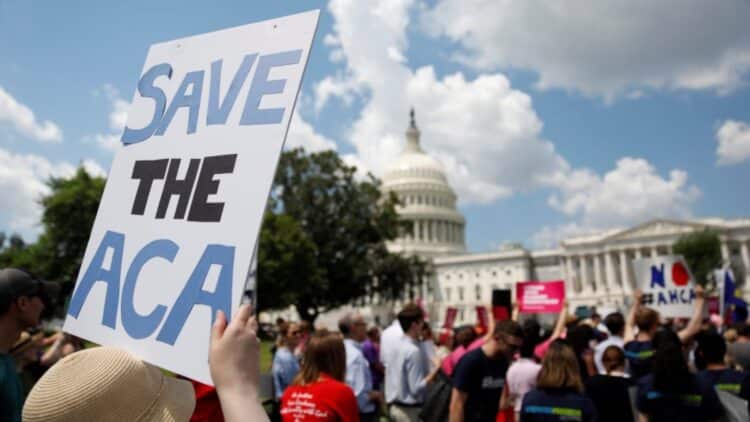Americans are holding their breath awaiting the decision to be made regarding the future of health insurance in the country. Currently, the United States Congress is debating the expansion of federal subsidies, enhanced by the Affordable Care Act (ACA), also known as Obamacare. These subsidies were already expanded once through the American Rescue Plan Act and the Inflation Reduction Act. However, their expiration date is approaching, as they are scheduled to expire on December 31, 2025. If these subsidies are not renewed, it will be the pockets of Americans that will have to face a 114% cost, according to information from KFF.
It has been Covered California’s Executive Director, Jessica Altman, and Sabrina Corlette from Georgetown University who have highlighted these alarming figures, according to News Nation. This is the main reason that has kept the federal government shutdown since October 1, 2025, with Democrats defending the extension of this aid to avoid the terrible consequences it would have on the American public. Those states that did not expand the aid at the time will suffer an increase in health insurance prices. Even higher. This includes Alabama, Florida, Georgia, Kansas, Mississippi, South Carolina, Tennessee, Texas, Wisconsin, Wyoming.
Affordable Care Act (ACA), Obamacare
So far, the stability of Americans’ health insurance has relied on key subsidies that helped address the high costs of the healthcare system. This aid is known as the Affordable Care Act (ACA), also called Obamacare, which is set to expire on December 31, 2025. That is why the more than 20 million beneficiaries of this social aid are at risk, making it one of the main points of debate causing the federal government to be shut down since October 1, 2025.
While congressional Democrats are pushing to extend these subsidies, Republicans are opposed. This subsidy was previously temporarily expanded by Congress through the American Rescue Plan Act and the Inflation Reduction Act, but there are no plans to do so again.
What would happen if the subsidy is not extended?
If these aids are not extended again, the monthly payment made by the consumer will increase drastically, with an estimated average jump from 97% to 114% for millions of enrollees. This means that a person who currently pays $27 per month would go on to pay $130. Beyond the cost that comes directly out of citizens’ pockets (and which represents a real concern), insurance companies fear that the increase in cost will cause healthy people to stop buying insurance, leaving only a smaller group with more health problems, which are more expensive.
Implications for the consumer
In the case that subsidies are ultimately extended, there would still be a problem. The base rates for premiums for 2026 have already been set by the companies, and that cannot change. Given this situation and assuming that premiums will already be more expensive, there are two options: either the subsidies are renewed and the government pays most of the cost, or they expire and the consumer must cover the full payment.
In addition, if these subsidies expire, some states will be more affected than others. This is because 10 states chose not to expand their Medicaid program, so the increase will be higher. The states affected by this decision would be:
- Alabama.
- Florida.
- Georgia.
- Kansas.
- Mississippi.
- South Carolina.
- Tennessee.
- Texas.
- Wisconsin.
- Wyoming.
We will have to wait for the government shutdown to be resolved and hope that the Democrats do not give in on defending the extension of this subsidy, which constitutes the foundation of healthcare for millions of Americans.
